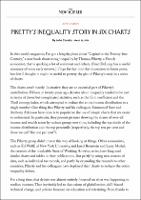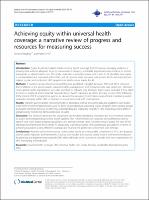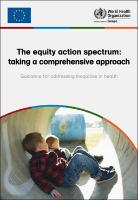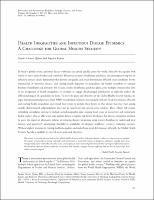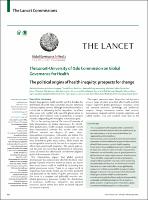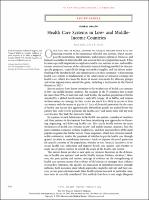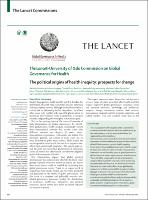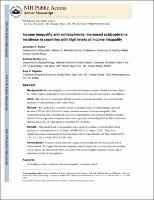Browsing 1. Health Equity by Issue Date
Now showing items 21-40 of 157
-
Cities, health and well-being
(2012)
Cities are critical sites for enquiry and action in relation to health and well-being. With up to 70 per cent of the world’s population estimated to be living in urban areas by 2050, global health will be determined increasingly in cities. In response to these challenges, the 2011 Urban Age Hong Kong conference, organized by the London School of Economics and Political Science and the Alfred Herrhausen Society in partnership with the University of Hong Kong, brought together over 170 planners, architects, sociologists, medical doctors, public ... -
Child Poverty and Inequality: New Perspectives
(2012)
The 21st century starts with vast inequalities for children in terms of income, access to food, water, health, education, housing, or employment for their families. Half of the world’s children are below the poverty line of $2 a day and suffer from multiple deprivations and violations to basic human rights. More than 22,000 children die each day, and most of their deaths are preventable. This volume presents some of the critical acknowledged voices to move a necessary agenda forward. It explains multidimensional poverty measurements, describes ... -
A Practitioner’s Guide for Advancing Health Equity: Community Strategies for Preventing Chronic Disease
(2013)
The intention of A practitioner’s guide for advancing health equity is to help practitioners and leaders incorporate a health equity view in their collaborations with community organizations. It offers ideas — with stories to illustrate — for how public health organizations can develop competency in the important work of building organizational capacity, engaging communities, developing partnerships and coalitions, and making the case for health equity. Each of the four sections of the Practitioner’s guide (1. foundational skills, 2. tobacco-free ... -
A new typology of policies to tackle health inequalities and scenarios of impact based on Rose's population approach
(Journal of Epidemiology and Community Health, 2013)
The last decade has witnessed a surge in interest for policies to tackle health inequalities. Adequate theoretical development of policy models is needed to understand how to design and evaluate equity-oriented health policies. In this paper we review Graham’s typology of policies (focused on the worst-off, on the gap, or on the gradient) and propose an adaptation (targeted, universal with additional targeting, redistributive, and proportionate universalism). For each type, potential scenarios of impact on population health and health inequalities ... -
Closing the health equity gap: policy options and opportunities for action
(World Health Organization, 2013)
This report, which highlights policy options for consideration within national discussions, was developed in conjunction with WHO regional offices and others across the Organization who are working on the social determinants of health and equity issues. The general approach to the report was discussed at a seminar within WHO’s Information, Evidence and Policy cluster and with WHO regional advisors following the release of the final report of the Commission on Social Determinants of Health in August 2008. In January 2009 the 124th session of the ... -
Ethnic Minority Development
(2013)
This paper was presented in the sixth China-ASEAN Forum on Social Development and Poverty Reduction, which was held on 26-27 September 2012 in Liuzhou, China. The forum was supported under the UNDP-IPRCC project. Southeast Asia and China together constitute nearly half of the total global ethnic minority population. This chapter will address the challenge of the development of ethnic minority groups in the ASEAN region, and China -
Piketty’s Inequality Story in Six Charts
(The New Yorker, 2014) -
Achieving equity within universal health coverage: a narrative review of progress and resources for measuring success
(2014)
Introduction: Equity should be implicit within universal health coverage (UHC) however, emerging evidence is showing that without adequate focus on measurement of equity, vulnerable populations may continue to receive inadequate or inferior health care. This study undertakes a narrative review which aims to: (i) elucidate how equity is contextualised and measured within UHC, and (ii) describe tools, resources and lessons which will assist decision makers to plan and implement UHC programmes which ensure equity for all. Methods: A narrative review ... -
The equity action spectrum: taking a comprehensive approach : guidance for addressing inequities in health
(World Health Organization, Regional Office for Europe, 2014)
While population health indicators have improved across Europe overall, that improvement has not been experienced equally everywhere, or by all. This is one of a series of policy briefs that describe practical actions to address health inequities, especially in relation to tobacco, alcohol, obesity and injury, the priority public health challenges facing Europe. It offers policy-makers and public health professionals the tools and guidance to implement the Health 2020 vision – the new health policy framework for Europe developed by WHO/Europe ... -
Health Inequalities and Infectious Disease Epidemics: A Challenge for Global Health Security
(2014)
In today's global society, infectious disease outbreaks can spread quickly across the world, fueled by the rapidity with which we travel across borders and continents. Historical accounts of influenza pandemics and contemporary reports on infectious diseases clearly demonstrate that poverty, inequality, and social determinants of health create conditions for the transmission of infectious diseases, and existing health disparities or inequalities can further contribute to unequal burdens of morbidity and mortality. Yet, to date, studies of influenza ... -
What does universal health coverage mean?
(The Lancet, 2014) -
Beating the Middle-Income Trap in Southeast Asia
(The Heritage Foundation, 2014)
Since 2000, Southeast Asia has had some of the fastest growing economies in the world. Indonesia’s economy has enjoyed 6 percent annual growth—but will its lack of infrastructure and its commodity dependence soon reveal some cracks in its economy? The remarkable growth in the Philippines will not last unless domestic investment is elevated. Thailand’s growth has stalled amid political turmoil, and it is currently in a classic credit bubble. Vietnam still generates impressive growth, but it has a banking problem, high inflation, and ubiquitous ... -
Is There a Southeast Asian Development Model?
(Department of International Economic Policy Institute for Economic Research University of Freiburg, 2014)
The 10 states of Southeast Asia have combined to form the developing world’s most successful and durable regional grouping, the Association of Southeast Asian Na-tions, ASEAN. Economic integration among them is high and increasing. The ambi-tious ASEAN Economic Community is scheduled to take effect from December 2015, and should further accelerate this integration. But the socio-economic and institution-al disparities among them are also very large. This paper therefore asks the ques-tion, does it make sense to contemplate a ‘Southeast Asian ... -
The political origins of health inequity: prospects for change
(The Lancet - University of Oslo Commission on Global Governance for Health, 2014)
Despite large gains in health over the past few decades, the distribution of health risks worldwide remains extremely and unacceptably uneven. Although the health sector has a crucial role in addressing health inequalities, its efforts often come into conflict with powerful global actors in pursuit of other interests such as protection of national security, safeguarding of sovereignty, or economic goals. This is the starting point of The Lancet–University of Oslo Commission on Global Governance for Health. With globalisation, health inequity ... -
Health care systems in low- and middle-income countries
(Massachusetts Medical Society, 2014-02-06)
This review draws on what is now quite an extensive literature on the deficiencies of health care systems and on the Health Systems Evidence database. However, the poor quality and uneven coverage of evidence on the strengthening of health care systems means that evidence of deficiencies is stronger than evidence of remedies. Moreover, the specific circumstances of individual countries strongly influence both decisions about which approaches might be relevant and their success, so any generalizations made from health systems research in particular ... -
The political origins of health inequity: prospects for change
(The Lancet, 2014-02-11)
Despite large gains in health over the past few decades, the distribution of health risks worldwide remains extremely and unacceptably uneven. Although the health sector has a crucial role in addressing health inequalities, its eff orts often come into confl ict with powerful global actors in pursuit of other interests such as protection of national security, safeguarding of sovereignty, or economic goals. This is the starting point of The Lancet–University of Oslo Commission on Global Governance for Health. With globalisation, health inequity ... -
ASEAN: The Rich & Poor Gap & The Drive for Growth
(2014-02-17) -
Income inequality and schizophrenia: Increased schizophrenia incidence in countries with high levels of income inequality
(2014-03)
Background—Income inequality is associated with numerous negative health outcomes. There is evidence that ecological level socio-environmental factors may increase risk for schizophrenia. Aims—The aim was to investigate whether measures of income inequality are associated with incidence of schizophrenia at the country level. Method—We conducted a systematic review of incidence rates for schizophrenia, reported between 1975 and 2011. For each country, national measures of income inequality (Gini coefficient) along with covariate risk factors for ... -
Group inequality and intersectionality
(E-Bulletin of the Human Development & Capability Association, 2014-07)







